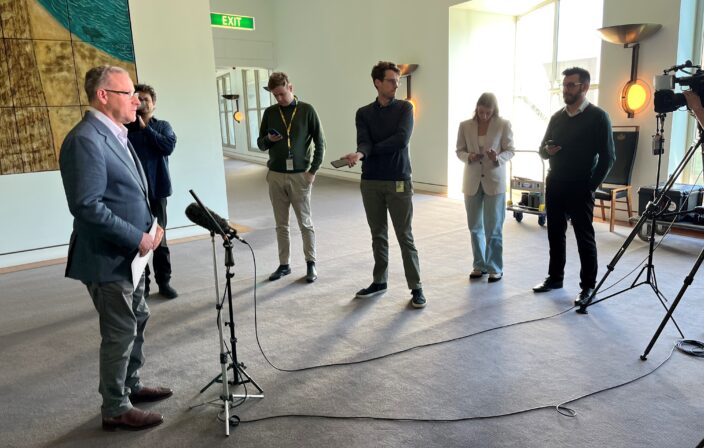Michele O’Neil and Andrew McKellar panel interview with Allison Langdon and Karl Stefanovic, The Today Show
26 Oct 2022
|Transcripts
Event: Michele O’Neil and Andrew McKellar panel interview with Allison Langdon and Karl Stefanovic, The Today Show.
Speakers: Allison Langdon, co-host The Today Show; Karl Stefanovic, co-host The Today Show; Michele O’Neil, president Australian Council of Trade Unions; Andrew McKellar, chief executive Australian Chamber of Commerce and Industry.
Date: 26 October 2022.
Topics: Federal budget; cost of living; workplace relations; wage growth.
E&OE
Allison Langdon, co-host The Today Show: Back now, and we’re breaking down budget 2022. And the biggest winner, well, I’m not sure anyone really did, but the deficit is less than expected. Treasurer Jim Chalmers is calling his first budget “a restraint budget”.
Karl Stefanovic, co-host The Today Show: To further discuss this, we’re joined by president of the Australian Council of Trade Unions, Michele O’Neil, and chief executive of the Australian Chamber of Commerce and Industry, Andrew McKellar. Good morning, guys. Nice to see you bright and early on this, what is it?
Allison: Wednesday.
Karl: Wednesday, Hump Day. We’re almost there. Hey Michelle, to you first up. Family budgets are hurting and the outlook for wages won’t really help fix that, will it?
Michele O’Neil, president Australian Council of Trade Unions: Look, it’s a really important start, Karl and Ally, on dealing with measures that are actually going to help cost of living and give some relief. But it also shows the need for urgent action on wages. What we know is that the government’s got measures in the Budget that are good about making childcare more affordable, improving paid parental leave, doing something about the housing crisis, and those free TAFE places are great. But importantly, the missing bit of the puzzle is changes to the laws that are going to let bargaining happen and more wage increases, show that wage growth that the government went into the election promising. And that’s going into Parliament, we understand, tomorrow. So the two things have got to come together, the measures in the budget and changes so we can get wages moving.
Allison: Well, I mean, we are being told that wages won’t move for at least two years, and when you hear electricity, petrol prices, everything’s going up, I mean, if you’re someone who’s struggling today, there’s nothing in this for you immediately.
Michele: Ally, there is some immediate things, as I said. It’s important to think about those changes that are going to give women the chance to get back to work. That’s going to improve opportunities for women. But also it’s good for the economy, that gets more money moving. But there is so much more that needs to be done. You’ve got to think how tough it is about paying for power prices. But also this just shows we’ve got to do something that is going to make it different for wages. We’ve had wages flat for a decade and they’re going backwards in real terms. And this is not every worker. CEO pays have been going more than 40 per cent in the last 12 months, and we’ve also seen profits up 28 per cent. It’s workers who aren’t getting a share, which is why we need to change the bargaining laws.
Karl: All right. Andrew, what about businesses? There didn’t seem to be a whole lot in it for business.
Andrew: Good morning, Karl. Good morning, Ally. And also, good morning to Michele. Look, I think it’s quite a practical and measured budget. I think we would say above all it’s a responsible budget. As Michele said, I think they’ve made a very responsible start in terms of addressing the overall fiscal position, getting the budget back on track. The savings that they’ve made I think are quite reasonable savings and there are some important measures in there that do start to address the problems that business are facing around skills and labour. So the investment in things like childcare and paid parental leave, and also the skills investment, the TAFE places, support for apprenticeships being maintained, I think these are all important things. The one area where I think business is really, really nervous, and that is the workplace relations changes that Michele’s referred to. We are not convinced that this will head in the right direction. We are really concerned that this will result in businesses being forced into agreements that they don’t support and leading to an increased risk of strikes and job losses.
Karl: All right.
Michele: It’s just the same old story, isn’t it? I mean, that’s the story that the business lobby has been saying for a long time. If we waited for Andrew and those big businesses that he represents to agree that it’s time for workers’ wages to go up, we’d be waiting a hell of a lot longer than what the budget says. We know this is a crisis and people can’t afford. We’ve seen fruit and veggies go up more than seven per cent. We know what’s happening with power prices and petrol. We’ve got to get wages moving. The government’s got to mandate on this. They went to the election saying they were going to do something about wages. We can’t spend more time waiting.
Karl: Michele, at least Andrew accepts that you’re making a point with a lovely smile on his face. We’ll leave it there this morning.
Michele: Thank you.
Andrew: Thanks.
Karl: We appreciate it. Thank you.


